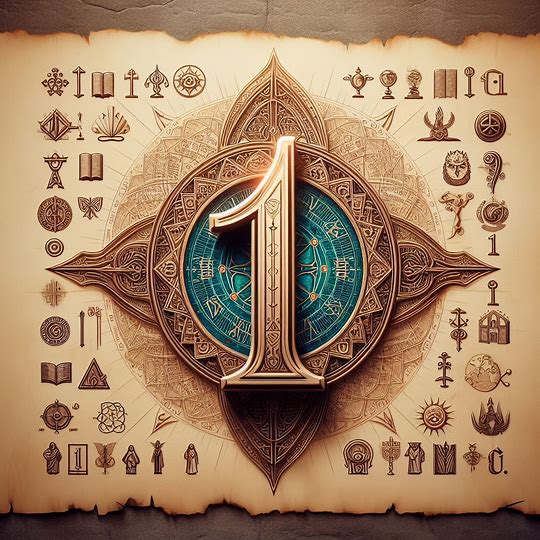What does Number 1 Mean Biblically?
The number 1 appears frequently throughout the Bible and is often associated with the concepts of unity and new beginnings. In the Old Testament, the first day of creation marks the beginning of God’s creative work (Genesis 1:1-5). This day is described as “one day,” emphasizing the unity and singularity of God’s act of creation.
The first commandment, “Worship no god but me” (Exodus 20:3), also underscores the primacy and exclusivity of God. This commandment serves as the foundation for all other commandments and establishes the importance of worshiping the one true God.
Key takeaways
- The number 1 represents unity, primacy, and new beginnings in the Bible.
- In Hebrew, the number 1 is represented by the letter Aleph (א) and symbolizes God’s oneness, divine power, and uniqueness.
- Jesus Christ is closely associated with the number 1, being the firstborn of all creation, the first fruits of the resurrection, and in unity with the Father.
- Applying the biblical meaning of number 1 involves cultivating unity in relationships, promoting unity within the Church, embracing new beginnings, overcoming setbacks, trusting in God’s plan, and living out the hope of new beginnings in Christ.

What does the Number 1 Represent in Hebrew?
In Hebrew, the number 1 is represented by the letter Aleph (א). In the Hebrew language and in the context of biblical numerology, the number 1 carries significant spiritual and symbolic meaning:
- Unity and oneness: The number 1 symbolizes the unity and oneness of God, as declared in the Shema (Deuteronomy 6:4), which states, “Hear, O Israel: The Lord our God, the Lord is one.”
- Beginning and primacy: As the first number, 1 represents the beginning, the first, and the most important. It signifies the primacy of God and His creation.
- Divine power and authority: The number 1 is associated with God’s divine power, authority, and sovereignty over all creation.
- Independence and self-sufficiency: In Hebrew numerology, the number 1 also symbolizes independence and self-sufficiency, as it stands alone and is not composed of other numbers.
- Uniqueness and exclusivity: The number 1 represents the uniqueness and exclusivity of God, as there is no other like Him.
In the Hebrew alphabet, each letter has a numerical value (gematria). Aleph, the first letter, corresponds to the number 1, further emphasizing its significance as the beginning and the source of all things.
The Number 1 and Jesus Christ
Jesus Christ, the Son of God and the Savior of mankind, are intricately connected to the biblical meaning of the number 1. The New Testament provides several instances that demonstrate Jesus’ association with this significant number:
- Firstborn of all creation: In Colossians 1:15, Jesus is described as “the firstborn of all creation.” This title emphasizes His preeminence and supremacy over all created things. As the firstborn, Jesus holds the highest position and authority in the universe, and all things were created through Him and for Him (Colossians 1:16).
- First fruits of the resurrection: Jesus is also referred to as the “first fruits of those who have fallen asleep” (1 Corinthians 15:20-23). His resurrection from the dead marks the beginning of a new era, where death has been conquered and eternal life is made available to believers. As the first fruits, Jesus’ resurrection guarantees the future resurrection of those who belong to Him.
- Unity with the Father: Throughout the Gospels, Jesus consistently affirms His unity with God the Father. In John 10:30, He declares, “I and the Father are one,” emphasizing their divine unity and the oneness of the Godhead. This unity is further elaborated in John 14:9-11, where Jesus states that anyone who has seen Him has seen the Father, and that He is in the Father and the Father is in Him.
- The only begotten Son: John 3:16 famously declares, “For God so loved the world, that He gave His only begotten Son, that whoever believes in Him shall not perish, but have eternal life.” The phrase “only begotten Son” highlights the unique relationship between God the Father and Jesus Christ, as Jesus is the only one of His kind, the singular and exclusive Son of God.
- The Alpha and the Omega: In the Book of Revelation, Jesus refers to Himself as “the Alpha and the Omega, the First and the Last, the Beginning and the End” (Revelation 22:13). Alpha is the first letter of the Greek alphabet, corresponding to the number 1. By identifying Himself with these titles, Jesus asserts His eternal nature, His primacy, and His role as the source and culmination of all things.
The biblical meaning of number 1, with its emphasis on unity, primacy, and new beginnings, finds its ultimate fulfillment in the person and work of Jesus Christ. His unique relationship with the Father. His preeminence over all creation, His role as the first fruits of the resurrection, and His identification as the Alpha and Omega all contribute to the rich symbolism and spiritual significance of this number in the Christian faith.

Applying the Biblical Meaning of Number 1
- Cultivating unity in personal relationships:
- “If it is possible, as far as it depends on you, live at peace with everyone.” (Romans 12:18)
- “Blessed are the peacemakers, for they will be called children of God.” (Matthew 5:9)
- “Be completely humble and gentle; be patient, bearing with one another in love.” (Ephesians 4:2)
- Promoting unity within the Church:
- “Just as a body, though one, has many parts, but all its many parts form one body, so it is with Christ.” (1 Corinthians 12:12)
- “Each of you should use whatever gift you have received to serve others, as faithful stewards of God’s grace in its various forms.” (1 Peter 4:10)
- “I appeal to you, brothers and sisters, in the name of our Lord Jesus Christ, that all of you agree with one another in what you say and that there be no divisions among you, but that you be perfectly united in mind and thought.” (1 Corinthians 1:10)
- Embracing new beginnings and fresh starts:
- “If we confess our sins, he is faithful and just and will forgive us our sins and purify us from all unrighteousness.” (1 John 1:9)
- “Since we live by the Spirit, let us keep in step with the Spirit.” (Galatians 5:25)
- “Have I not commanded you? Be strong and courageous. Do not be afraid; do not be discouraged, for the Lord your God will be with you wherever you go.” (Joshua 1:9)
- Overcoming past failures and setbacks:
- “Therefore, if anyone is in Christ, the new creation has come: The old has gone, the new is here!” (2 Corinthians 5:17)
- “And we know that in all things God works for the good of those who love him, who have been called according to his purpose.” (Romans 8:28)
- “As iron sharpens iron, so one person sharpens another.” (Proverbs 27:17)
- Trusting in God’s oneness and sovereign plan:
- “Trust in the Lord with all your heart and lean not on your own understanding; in all your ways submit to him, and he will make your paths straight.” (Proverbs 3:5-6)
- “‘For I know the plans I have for you,’ declares the Lord, ‘plans to prosper you and not to harm you, plans to give you hope and a future.'” (Jeremiah 29:11)
- “Take delight in the Lord, and he will give you the desires of your heart.” (Psalm 37:4)
- Living out the hope and possibility of new beginnings:
- “But in your hearts revere Christ as Lord. Always be prepared to give an answer to everyone who asks you to give the reason for the hope that you have. But do this with gentleness and respect.” (1 Peter 3:15)
- “You are the light of the world. A town built on a hill cannot be hidden.” (Matthew 5:14)
- “Then I saw ‘a new heaven and a new earth,’ for the first heaven and the first earth had passed away, and there was no longer any sea.” (Revelation 21:1)
Embracing God’s Primacy and New Beginnings Through Number 1
As we reflect on the biblical meaning of number 1 and its presence in our lives, we are reminded of the profound spiritual truths it represents. When you encounter this number repeatedly, consider it a gentle reminder from God to focus on unity, prioritize your relationship with Him, and embrace the new beginnings He offers.
Seeing 01 can prompt you to examine your relationships and strive for greater harmony, both with God and others. It may also encourage you to reassess your priorities, ensuring that God is at the center of your life and that your thoughts, actions, and decisions align with His will. Allow the biblical significance of number 1 to inspire and guide you on your spiritual journey. By recognizing its presence and applying its lessons, you can cultivate a closer relationship with God, strengthen your faith, and live out the hope and possibility that comes with a life in Christ.
Let us be attentive to the appearance of number 1 and let its meaning inspire you to walk in unity, keep God first, and confidently embrace the new beginnings He has in store for you.
Related Biblical Numbers
While exploring the biblical meaning of number 1, it’s insightful to consider its relationship with other numerologically significant numbers:
- Number 1 (Current Page): Represents divine unity and the nature of God.
- Number 10: Building upon the concept of unity, the number 10 often symbolizes completeness or divine order in the Bible. It can be seen as a combination of 1 (unity) and 0 (wholeness).
- Number 11: Often interpreted as a doubling of 1, number 11 can represent disorder or chaos in biblical contexts, standing in contrast to the perfect order of 10.
- Number 111: This triple repetition of 1 is sometimes seen as an amplification of unity, potentially symbolizing the Trinity or a divine message.
- Number 1111: In some interpretations, 1111 is viewed as a wake-up call or a sign of angelic presence, emphasizing the unity represented by 1 to an even greater degree.









1 thought on “Biblical Meaning of Number 1: Unity, Primacy, and New Beginnings”